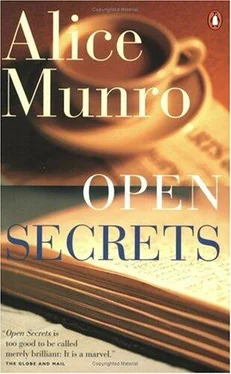Bounder knew him, of course, because he often went by and sometimes cut across the property on his walks and they never stopped him. He came right through the yard, sometimes — it was just because he didn’t know any better anymore. She never yelled at him, the way some people did. She had even invited him to sit on the steps and rest if he was tired, she had offered him a cigarette. He would take the cigarette, too. But he would never sit down.
Bounder was just nosing around and fawning on him. Bounder was not particular.
Maureen knew Mr. Siddicup, as everybody did. He used to be the piano tuner at Douds. He used to be a dignified, sarcastic little Englishman, with a pleasant wife. They read books from the library and were noted for their garden, especially strawberries and roses. Then, a few years ago, misfortunes started arriving. Mr. Siddicup had an operation on his throat — it must have been for cancer — and after that he could not talk, just make wheezing and growling noises. He had already retired from Douds — they had some electronic way of tuning pianos now, better than the human ear. His wife died suddenly. Then the changes came in a hurry — he deteriorated from a decent old man into a morose and rather disgusting old urchin, in a matter of months. Dirty whiskers, dribbles on his clothes, a sour smoky smell, and a look in his eyes of constant suspicion, sometimes of loathing. In the grocery store if he could not find what he wanted, or if they had changed the places of things, he would knock canned goods and boxes of cereal over on purpose. He was not welcome anymore in the café, and never went near the library. Women from his wife’s church group kept going to see him for a while, bringing a meat dish or some baking. But the smell of the house was dreadful and the disorder perverse — even for a man living alone it was inexcusable — and he was the opposite of grateful. He would toss the remainders of pies and casseroles out on his front walk, breaking the dishes. No woman wanted the joke going round that even Mr. Siddicup wouldn’t eat her cooking. So they left him alone. Or when you were driving along, you might spot him standing still, standing in the ditch, mostly hidden in tall weeds and grass, while cars whizzed by him. You could also run into him in a town miles away from home, and there a strange thing would happen. His face would take on something of its old expression, ready for the genial obligatory surprise, the greeting of people who lived in one place meeting in another. It did look as if he had a hope then that the moment would open out, that words would break through, in fact that perhaps the changes would be wiped out, here in a different place — his voice and his wife and his old stability in life might all be returned to him.
People were not unkind, usually. They were patient up to a point. Marian said she would never have chased him off.
She said he looked pretty wild, this time. Not just as he looked when he was trying to get his meaning out and it would not come, or when he was mad at some kids who were teasing him. His head was bobbing back and forth and his face looked swollen up, like a bawling baby’s.
Now then, she said. Now, Mr. Siddicup, what’s the matter? What are you trying to tell me? Do you want a cigarette? Are you telling me it’s Sunday and you’re all out of cigarettes?
Shook his head back and forth, then bobbed it up and down, then shook it back and forth again.
Come on, now. Make up your mind, said Marian.
Ah, ahh was all he said. He put both hands to his head, knocking off his cap. Then he backed farther off and started zigzagging around the yard in between the pump and the clothesline, still making these noises— ah, ahh —that would never turn into words.
Here Marian pushed back her chair so abruptly that it almost fell over. She got up and began to show them just what Mr. Siddicup had done. She lurched and crouched and banged her hands to her head, though she did not dislodge her hat. In front of the sideboard, in front of the silver tea service presented to Lawyer Stephens in appreciation of his many years’ work for the Law Society, she put on this display. Her husband held his coffee cup in both hands and kept his deferential eyes on her by an effort of will. Something flashed in his face — a tic, a nerve jumping in one cheek. She was watching him in spite of her antics, and her look said, Hold on. Be still.
Lawyer Stephens, as far as Maureen could see, had not glanced up at all.
He did like that, Marian said, reseating herself. He did like that, and because she had not been feeling well herself, she got the idea that perhaps he was in pain.
Mr. Siddicup. Mr. Siddicup. Are you trying to tell me your head hurts? Do you want me to get you a pill? Do you want me to take you to the doctor?
No answer. He wouldn’t stop for her. Ah, ahh .
In his stumbling around he found himself at the pump. They had running water in the house now, but still used the pump outside and filled Bounder’s dish at it. When Mr. Siddicup took note of what it was, he got busy. He went to work on the handle and pumped it up and down like crazy. There wasn’t any cup to drink from, like there used to be. But as soon as water came he stuck his head under. It splashed and stopped, because he had quit pumping. Back he went and pumped again, and stuck himself under again, and on like that, pumping and dousing, letting it pour over his head and face and shoulders and chest, soaking himself and still, when he could, making some noise. Bounder was excited and ran around bumping into him and letting out barks and whines in sympathy.
That’s enough, you two! Marian yelled at them. Let go that pump! Let go and settle down!
Only Bounder listened to her. Mr. Siddicup had to keep on till he got himself so drenched and blinded he couldn’t find the pump handle. Then he stopped. And he lifted one arm up, he lifted and pointed, back in the general direction of the bush and the river. He was pointing and making his noises. At the time, that didn’t make any sense to her. She didn’t think about it till later. Then he quit that and just sat down on the well cover, soaked and shivering, with his head in his hands.
Maybe it’s something simple after all, she thought. Complaining because there isn’t a cup.
If it’s a cup you want, I’ll go and get you one. No need to carry on like a baby. You stay there, I’ll go and get you a cup.
She headed back to the kitchen and got a cup. And she had another idea. She fixed him up some graham crackers, with butter and jam. That was a kid’s treat, graham crackers, but it was a thing old people liked, too, she remembered from her mother and daddy.
Back to the door she went and pushed it open with her hands full. But there was no sign of him. Nobody in the yard but Bounder, looking the way he did when he knew he’d made a fool of himself.
Where did he go, Bounder? Which way did he go?
Bounder was ashamed and fed up and wouldn’t give any sign. He slunk off to his place in the house shade, in the dirt, by the foundations.
Mr. Siddicup! Mr. Siddicup! Come see what I got for you!
All silent as the dead. And her head was pounding. She started eating the crackers herself but she shouldn’t have — a couple of bites and she wanted to puke.
She took two more pills and went back upstairs. The windows up and blinds down. She wished now they’d bought a fan when the sale was on at Canadian Tire. But she slept without one, and when she woke it was nearly dark. She could hear the mower— he , her husband, was out finishing the grass at the side of the house. She went down to the kitchen and saw that he had cut up some cold potatoes and boiled an egg and pulled green onions to make a salad. He was not like some men — a hopeless case in the kitchen waiting for the woman to get out of a sickbed and make him a meal. She picked at the salad but couldn’t eat. One more pill and up the stairs and dead to the world till morning.
Читать дальше












